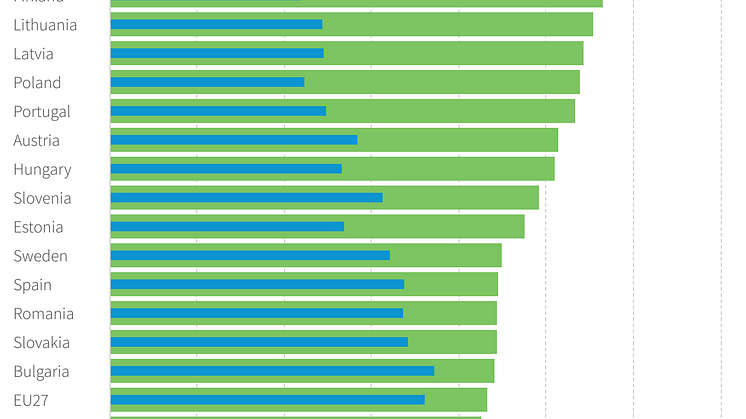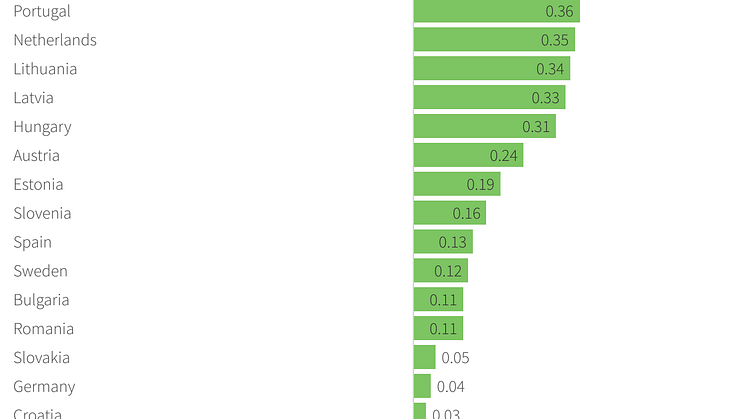
News -
Germany sees sharp decline in trust in national government, EU during COVID-19
Trust in Germany’s national government decreased from 5.7 to 4.3 between summer 2020 and spring 2021, according to Eurofound’s large-scale Living, working and COVID-19 online survey. This is the third largest decline compared to other EU countries, behind Austria and Cyprus. This trend is visible in all Member States, where trust in national governments in March 2021 is lower than it was at the start of the pandemic in spring 2020.
The third round of the unique pan-EU survey was fielded in February and March 2021 and the analysis is based on a sample of 46,800 responses, and an overall sample of 138,629 across all three rounds. It sheds light on the social and economic situation of people across Europe following nearly a full year of living with COVID-19 restrictions.
Germany also records the largest decrease in trust in the EU (-1.4 points) from 5.4 to 4 between summer 2020 and spring 2021, with the latest figure below the EU average for the first time. Furthermore, 9.1% of people in Germany report not trusting science – a figure only higher in Bulgaria, Poland and Austria. Similarly, Germany recorded the biggest decrease in trust in science in the EU, with 29.7% saying their trust decreased since the beginning of the pandemic.
The survey also found particularly low levels of satisfaction with pandemic support measures in Germany. For example, 9.3% of respondents in Germany agreed that the measures are clear and transparent, while 15.4% agreed with the statement in the EU average. Equally, 6.5% of people in Germany find that the measures reach those who need them most, as compared to the EU average of 12.1%.
Other recent Eurofound research has shown that trust in institutions to be one of the key drivers of optimism at country-level, while facilitating access to high-quality public services can help to (re)build trust in institutions. The Social Optimism Index, developed by Eurofound, refers to a general expectation that social issues will turn out well. Based on pre-pandemic data, Germany scores 0.04, while Ireland (0.687) is the most socially optimistic country and Greece (-0.65) the most pessimistic.
Based on the Index and different types identified, the report Towards the future of Europe: Social factors shaping optimism and pessimism among citizens characterises only slightly over 4 in 10 Germans (42.7%) as optimists, more than 3 in 10 as pessimists (34.7%) and 2 in 10 (22.6%) as neither optimists nor pessimists. In the group of countries, where optimists slightly outnumber the pessimists, Germany is joined by Slovenia, Estonia, Sweden, Spain, Romania, Slovakia, Bulgaria and Croatia.
When analysing the prospects for future generations, more than half of EU citizens (54%) think that life will be more difficult for today’s young people than it is for adults today. However, in Germany (58%) people are more pessimistic in this regard.
Further information
- Report: Living, working and COVID-19 (Update April 2021): Mental health and trust decline across EU as pandemic enters another year
- Report: Towards the future of Europe: Social factors shaping optimism and pessimism among citizens
- Data: Living, working and COVID-19
- Data: Quality of life during COVID-19 – Germany
- Data: Democracy and trust during COVID-19 - Germany
- Data: Working during COVID-19 – Germany
- Data: Financial situation and security during COVID-19 – Germany
- Data: Quality of public services during COVID-19 – Germany
- Data: Support measures during COVID-19 - Germany
- Data: Vaccinations during COVID-19 - Germany
- Data: Quality of life during COVID-19 – Germany
- Database: COVID-19 EU PolicyWatch – Germany
- Working paper: Germany: Working life in the COVID-19 pandemic 2020






